Ravana’s Stotra That Made the God of Destruction Pause
Noopur Kumari | Apr 30, 2025, 08:15 IST

( Image credit : Times Life Bureau )
What happens when the mightiest demon breaks—not in battle, but in devotion? This is the forgotten tale of Ravana’s pain, surrender, and the powerful Stotra that made even Lord Shiva stop and listen. A story of ego, music, and divine mercy, this article unveils the emotional moment when pride turned into prayer—and a feared villain became a legendary devotee. You’ve never seen Ravana like this before.
Namah Shivay cha Rudray cha, Namah Shivtaray cha – Yajurveda.
One demon king, feared by the gods and admired by warriors, accomplished the unimaginable in a world where ego ruled and power defined the powerful. He sobbed in surrender rather than in agony or defeat. Furthermore, he did not offer gold or blood.
It was a work of poetry. There was music. The Shiv Tandav Stotra was it. Indeed, the antagonist of the Ramayana, Ravana, was a fervent follower of Lord Shiva. However, there is a secret tale that you have most likely never heard of, how Mahadev's heart was warmed by Ravana's heavenly tune and how his haughtiness transformed into agonising devotion. Let's explore the evocative, enigmatic, and breathtaking tale of pride, punishment, prayer, and final grace that lies beneath this fabled Stotra.
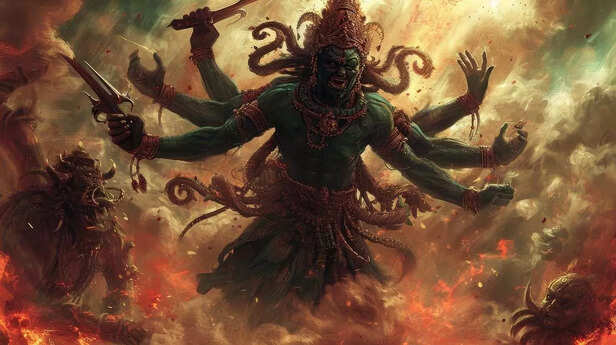
Once upon a time, Ravana's pride was as high as the sky. With his unrivalled strength, intelligence, and boons, he ventured to raise Mount Kailash, Shiva's holy dwelling. However, Shiva destroyed Ravana's ego beneath the mountain with a simple push of his toe. Ravana writhed, trapped and tormented, in soul-shaking humility as well as bodily pain. Days went by in agony and quiet until pride gave way to submission. In addition to breaking a king, it moment gave birth to a devotee. Sometimes the only way to genuinely rise is to be crushed. When they kneel in truth, even demons can find divinity.
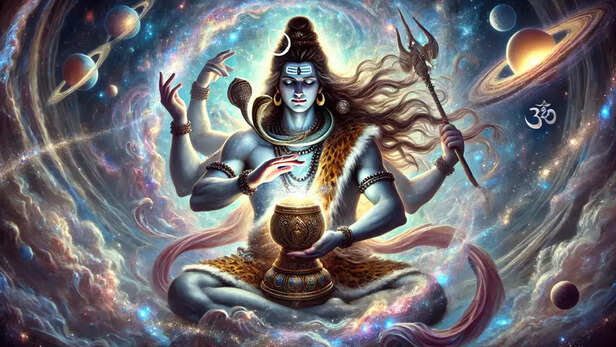
In agony and surrender, crushed under the weight of a mountain, Ravana did the unthinkable: he sung. He strummed his own veins like a veena with broken fingers, and the Shiv Tandav Stotra—a hymn of divine devotion rather than desperation—rose from his suffering. Every word and beat glorified every pulse of Mahadev, his soul pulsing in time with the universe. It was more than just a chant; it was a symphony of poetry, fire, and surrender. According to mythology, even Shiva stopped his Tandav… to listen at that precise moment. Pain can have such power when it is transformed into unadulterated devotion.
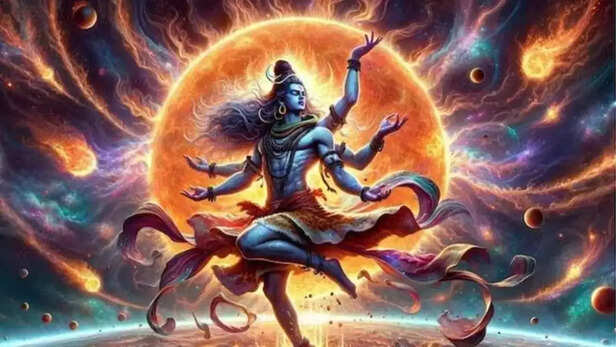
Shiva—the merciless, the destroyer—never submitted to wealth or ceremonies. Shiva, however, paid attention when Ravana, broken and enraged, offered his soul, which was dripping with suffering and unadulterated devotion. He was given the celestial sword Chandrahas and a boon of near invincibility by Shiva, who was moved by the depth of his sacrifice and forgave him. This lost story hints at a more profound reality: even the strongest people falter, and villains have their moments of grace. And even God cannot turn away when a broken heart gives up without ego.
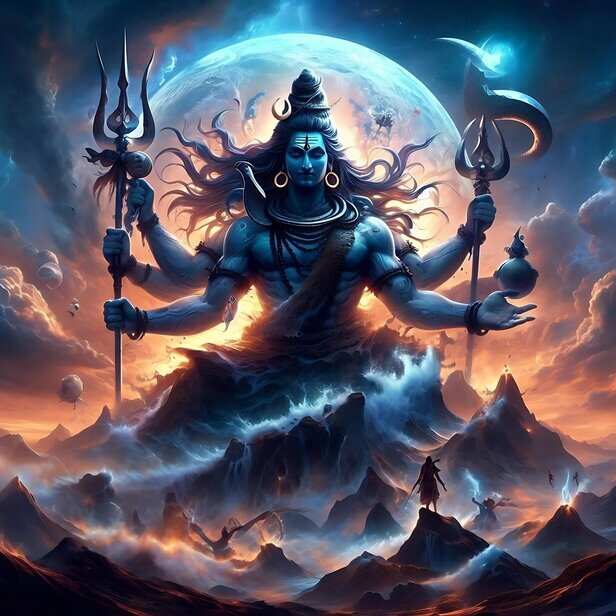
You may have heard the Shiv Tandav Stotra echo through temples or during Shivratri, but did you know—it’s more than a prayer? It’s a divine vibrational weapon. Ancient sages believed its thunderous rhythm could awaken the sleeping energies within you, especially the chakras. Each Sanskrit syllable pulses with raw cosmic force, tearing through layers of ego and illusion. When chanted with true surrender, it doesn’t just praise Shiva—it transforms you. It stirs the soul, ignites inner fire, and opens the door to realms beyond logic. This isn’t just devotion. It’s power, it's awakening, it's Shiva roaring through your very being. 
Few people are willing to admit this, yet pilgrims to Kailash, Shiva's hallowed residence, frequently bow to Ravana. As a loyal seeker, not as a villain. In clandestine tantric traditions, Ravana is honoured for his surrender rather than his strength. In addition to being a king, he was a bhakt who gave Shiva his entire being. Some sadhus assert that it is impossible to fully understand Shiv Bhakti if Ravana's devotion is not honoured. Beneath the terrifying stories is a heart that had a close understanding of the holy. He became the silent protector of the route to Shiva as a result of that surrender.
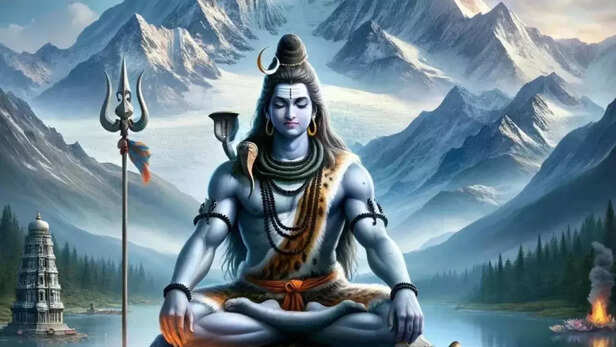
With its ethereal spirit, India conceals secrets that contradict the established. In regions such as Mandsaur, Bisrakh, and Ravangram, Ravana is venerated rather than reviled. As a strong follower of Lord Shiva, not as a villain. The atmosphere here is one of intense devotion rather than fear. Sung with wonder rather than rage, the Shiv Tandav Stotram roars like sacred fire. These shrines celebrate his faith, intelligence, and unending love for Shiva rather than his fall. The distinction between a demon and a devotee becomes hazy in many parts of India, leaving only the unquenchable flame of divine love.There is more to Ravana's narrative than his demise. It's about giving up control and finding salvation. The Shiv Tandav was born in suffering, ego death, and dedication; it was not penned in comfort. Perhaps Mahadev is more interested in truth than in perfection.
The next time you hear the thunder of the Stotra, keep this in mind: If their heart beats in time with surrender, even the most feared can become the most blessed.
शिवाय नमस्तुभ्यं, मृत्युंजयाय धीमहि।
तन्नो रुद्रः प्रचोदयात्॥"
Explore the latest trends and tips in Health & Fitness, Travel, Life Hacks, Fashion & Beauty, and Relationships at Times Life!
One demon king, feared by the gods and admired by warriors, accomplished the unimaginable in a world where ego ruled and power defined the powerful. He sobbed in surrender rather than in agony or defeat. Furthermore, he did not offer gold or blood.
It was a work of poetry. There was music. The Shiv Tandav Stotra was it. Indeed, the antagonist of the Ramayana, Ravana, was a fervent follower of Lord Shiva. However, there is a secret tale that you have most likely never heard of, how Mahadev's heart was warmed by Ravana's heavenly tune and how his haughtiness transformed into agonising devotion. Let's explore the evocative, enigmatic, and breathtaking tale of pride, punishment, prayer, and final grace that lies beneath this fabled Stotra.
1. Ravana’s Ego That Tried to Lift Mount Kailash

Ravana’s Ego
( Image credit : Times Life Bureau )
Once upon a time, Ravana's pride was as high as the sky. With his unrivalled strength, intelligence, and boons, he ventured to raise Mount Kailash, Shiva's holy dwelling. However, Shiva destroyed Ravana's ego beneath the mountain with a simple push of his toe. Ravana writhed, trapped and tormented, in soul-shaking humility as well as bodily pain. Days went by in agony and quiet until pride gave way to submission. In addition to breaking a king, it moment gave birth to a devotee. Sometimes the only way to genuinely rise is to be crushed. When they kneel in truth, even demons can find divinity.
2. The Birth of the Shiv Tandav Stotra

Shiv Tandav Stotra
( Image credit : Times Life Bureau )
In agony and surrender, crushed under the weight of a mountain, Ravana did the unthinkable: he sung. He strummed his own veins like a veena with broken fingers, and the Shiv Tandav Stotra—a hymn of divine devotion rather than desperation—rose from his suffering. Every word and beat glorified every pulse of Mahadev, his soul pulsing in time with the universe. It was more than just a chant; it was a symphony of poetry, fire, and surrender. According to mythology, even Shiva stopped his Tandav… to listen at that precise moment. Pain can have such power when it is transformed into unadulterated devotion.
3. Shiva’s Heart Melts—Blessing the Unbeliever

Shiva, the God of destruction
( Image credit : Times Life Bureau )
Shiva—the merciless, the destroyer—never submitted to wealth or ceremonies. Shiva, however, paid attention when Ravana, broken and enraged, offered his soul, which was dripping with suffering and unadulterated devotion. He was given the celestial sword Chandrahas and a boon of near invincibility by Shiva, who was moved by the depth of his sacrifice and forgave him. This lost story hints at a more profound reality: even the strongest people falter, and villains have their moments of grace. And even God cannot turn away when a broken heart gives up without ego.
4. Shiv Tandav Stotra Is Not Just a Hymn—It’s a Weapon

Shiv Tandav Stotra
( Image credit : Pixabay )
You may have heard the Shiv Tandav Stotra echo through temples or during Shivratri, but did you know—it’s more than a prayer? It’s a divine vibrational weapon. Ancient sages believed its thunderous rhythm could awaken the sleeping energies within you, especially the chakras. Each Sanskrit syllable pulses with raw cosmic force, tearing through layers of ego and illusion. When chanted with true surrender, it doesn’t just praise Shiva—it transforms you. It stirs the soul, ignites inner fire, and opens the door to realms beyond logic. This isn’t just devotion. It’s power, it's awakening, it's Shiva roaring through your very being.
5. Why Ravana Still Guards the Door to Kailash Today

pilgrims to Kailash
( Image credit : Times Life Bureau )
Few people are willing to admit this, yet pilgrims to Kailash, Shiva's hallowed residence, frequently bow to Ravana. As a loyal seeker, not as a villain. In clandestine tantric traditions, Ravana is honoured for his surrender rather than his strength. In addition to being a king, he was a bhakt who gave Shiva his entire being. Some sadhus assert that it is impossible to fully understand Shiv Bhakti if Ravana's devotion is not honoured. Beneath the terrifying stories is a heart that had a close understanding of the holy. He became the silent protector of the route to Shiva as a result of that surrender.
6. The Forgotten Temples of Ravana-Shiva Worship

Ravana-Shiva Worship
( Image credit : Times Life Bureau )
With its ethereal spirit, India conceals secrets that contradict the established. In regions such as Mandsaur, Bisrakh, and Ravangram, Ravana is venerated rather than reviled. As a strong follower of Lord Shiva, not as a villain. The atmosphere here is one of intense devotion rather than fear. Sung with wonder rather than rage, the Shiv Tandav Stotram roars like sacred fire. These shrines celebrate his faith, intelligence, and unending love for Shiva rather than his fall. The distinction between a demon and a devotee becomes hazy in many parts of India, leaving only the unquenchable flame of divine love.
When Pride Breaks, Prayer Begins
The next time you hear the thunder of the Stotra, keep this in mind: If their heart beats in time with surrender, even the most feared can become the most blessed.
शिवाय नमस्तुभ्यं, मृत्युंजयाय धीमहि।
तन्नो रुद्रः प्रचोदयात्॥"
Explore the latest trends and tips in Health & Fitness, Travel, Life Hacks, Fashion & Beauty, and Relationships at Times Life!
